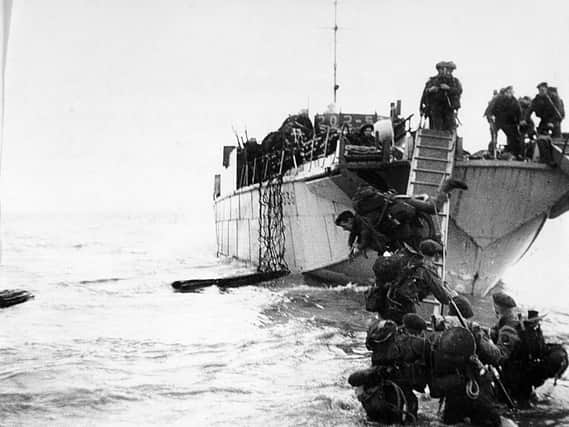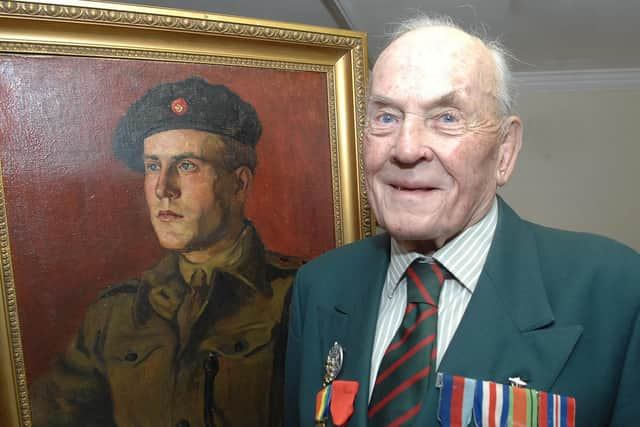Twins who fought in D-Day landing - war hero David, 91, looks back


David Hopkins was just 19 and a newly-commissioned 2nd lieutenant in the King’s Royal Rifle Corps when he took part in the momentous landings in Normandy on Tuesday, June 6, 1944.
Talking to the ‘Gazette, Mr Hopkins played down his heroism and said he was surprised to receive the Legion d’Honneur at the request of French President François Hollande.
Advertisement
Hide AdAdvertisement
Hide Ad“I suppose I feel grateful. Actually, that’s not quite the right word. I feel honoured.


“I don’t think bravery was involved at all.
“You didn’t stop and think about things.”
This former lawyer only recently moved to the village with his wife Jennifer, having lived for 40 years at their farm in Laverton, near Galphay.
For David, personally, D-Day didn’t end well.


He was injured in a German mortar attack after helping to take Juno beach.
Amazingly, his twin brother Geoffrey was involved in the same landing in the same regiment.
Advertisement
Hide AdAdvertisement
Hide AdThe award of France’s highest honour, came out of the blue, David says.
“It was President Hollande’s idea. He went to the 70th anniversary of D-Day last year and said that he would give a medal to all the people still alive who served in the liberation of France. Three officers in my regiment qualified, including me. I suppose I feel grateful. Actually, that’s not quite the right word. I feel honoured.
“I was surprised the French would honour people for actions so remote from the present situation.
Having become a specialist in commercial law in a practice in Leeds after the war, he and his charming wife Jennifer, who wrote the social diary page for Tatler magazine for a time, moved into Bishop Thornton recently after living for 40 years at their farm in Laverton near Galphay.
Advertisement
Hide AdAdvertisement
Hide AdLooking a little frail but mentally sharp, David’s D-Day experiences remain as fresh in his mind as ever.
Born in Leeds, schooled in Berkshire, with parents in Skipton, D-Day was the first action David had seen since signing up just a year earlier.
“We were waiting on standby for in a small mass of landing craft for four nights on rough seas. There was no prior information given to the troops about D-Day but the whole of England was expecting it to happen.
“We just wanted to get on with it. It was dark. We didn’t have the slightest idea what we were in for.”
Advertisement
Hide AdAdvertisement
Hide AdTrained partly at York and Strensall the previous year, David was among British troops supporting the 3rd Canadian Infantry Division on Juno beach which spanned from Courseulles, a village just east of the British beach Gold, to Saint-Aubin-sur-Mer, just west of the British beach Sword.
After helping establish a beach-head in the face of enemy fire, David’s role in the first hours after D-Day was to move up to the frontline above the beach with artillery to stop potential German counter-attacks until British tanks could take over at dawn.
But David was never to get the chance to be part of the breakout from Normandy in the following weeks which saw Montgomery and Patton compete to be first to breach the German border.
On his second night ashore the moment any soldier dreads happened to David.
Advertisement
Hide AdAdvertisement
Hide Ad“I was coming back from the front one night by motorbike to our makeshift HQ at a French farmhouse when a mortar bomb came over and landed between myself and a wall.
“Fortunately for me but very sadly for my driver, he and the motorbike took part of the impact.
“He was killed outright. It was traumatic. I’d seen people killed before but only from a distance.
“I was thrown up in the air and blown into a small copse.
“The shrapnel goes all over you and into your body everywhere. I was only semi-conscious. It was fairly painful but I don’t remember too much about it.”
Advertisement
Hide AdAdvertisement
Hide AdStretchered to a casualty clearing section which was bombed by the Luftwaffe regularly at night, David was eventually flown back to Britain where the process of treating his wounds took weeks.
But that isn’t where the tale ends. Little is straightforward in war and David’s story has more twists than most.
Unknown to him at the time, his twin brother Geoffrey was looking for him.
They’d been together at school and had joined the same army regiment.
Advertisement
Hide AdAdvertisement
Hide AdBoth had landed on the same beach at D-Day, though in different companies.
In the heat of battle neither brother saw each other but Geoffrey must have heard about David’s After recovering from his wounds, David was transferred to a new battalion for the remainder of the conflict.
Possibly a blessing in disguise, he was taken off the frontline and posted to military government duties in Belgium and Germany as the Allies liberated western Europe one piece at a time.
As for David’s brother Geoffrey, he was in the thick of battle all the way to VE Day.
Advertisement
Hide AdAdvertisement
Hide AdDespite spending most of the conflict in the frontline, Geoffrey, too, emerged unscathed at war’s end.
David said: “Geoffrey went through the whole campaign. He saw a lot of action but stayed safe, fortunately.”
To the victors, the spoils and there were happier times as the Allies defeated Hitler.
As an officer, David enjoyed some privileges and savoured the nicer moments, particularly when he was reunited with his brother.
Advertisement
Hide AdAdvertisement
Hide Ad“I remember Geoffrey and myself celebrated our 21st birthday in November 1945 in the American officers club at Potsdam in Berlin.
“A Russian refugee, who was a very good artist, painted my portrait, which is still on my wall. I paid him with some food.”
David left the army in 1947 in the rank of captain and headed back north to take up law.
It’s there he met his future wife, the beautiful Jennifer. Both of them hailed from wealthy backgrounds in North Yorkshire as youngsters, she from the Cameron brewing family, he the son of Scatcherd, Hopkins and Brighouse solicitors of Leeds.
Advertisement
Hide AdAdvertisement
Hide AdTheir social circles in North Yorkshire tended to overlap and, in November 1955, they married at a church near Thirsk. They went on to have four children and six grandchildren and celebrated their 60th wedding anniversary recently.
As for Geoffrey, after the end of his army days he and David attended the regimental dinner for the King’s Royal Rifle Corps in London together each year.
Since Geoffrey died three years ago, David no longer travels south to this meeting of old comrades.
How David came to join the war says everything.
David said: “I was excited to sign up because almost all the boys who left school went in the services. It was something one looked forward to.”
His was a different, more heroic generation. They didn’t dwell on things. They just got on with the job of winning the war.